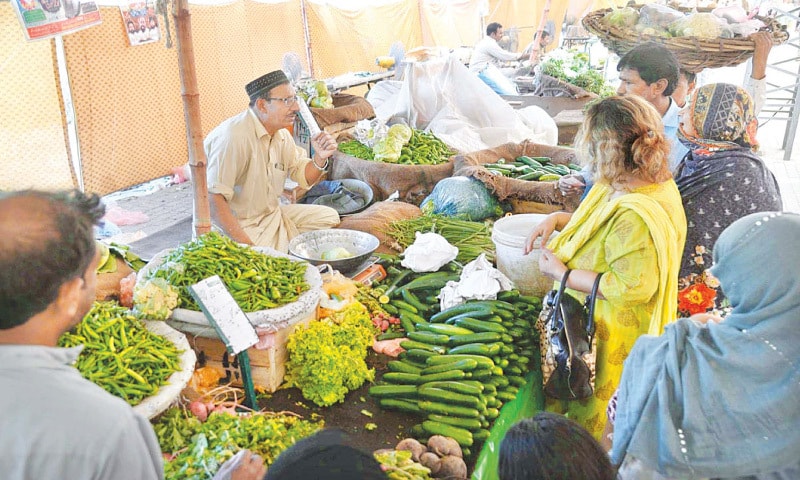Inflation measured through the Sensitive Price Indicator (SPI) increased 1.53 percent during the week ended on April 7, owing to a rise in the prices of essential food items, Pakistan Bureau of Statistics (PBS) data showed on Friday.
This was the biggest increase in weekly prices since Nov 11, when the SPI jumped 1.81 percent.
One reason behind rising prices is the advent of Ramazan, when the consumption of vegetables, especially potatoes, onions and tomatoes, and fruits goes through the roof.
Data shows that the prices of 22 essential food items increased during the week under review compared to the previous week.
The price of tomatoes increased 52.75 percent, followed by onions 27.34 percent, bananas 12.24 percent, garlic 2.80 percent, beef (with bones) 2.74 percent, mutton 2.70 percent, cooking oil 2.29 percent, liquefied petroleum gas (LPG) 11.67kg cylinder 2.14 percent, salt powdered 1.7 percent, vegetable ghee 1.35 percent, eggs 0.41 percent, pulse gram 0.33 percent, pulse masoor 0.33 percent, mustard oil 0.23 percent, and fresh milk 0.21 percent.
On the other hand, the prices of eight items increased during the week, including powdered chillies 3.29 percent, chicken 2.92 percent, potatoes 0.91 percent, wheat flour bag 0.68 percent, gur 0.54 percent, pulse mash 0.33 percent, sugar 0.09 percent, and pulse moong 0.01 percent.
The SPI increased by 1.85 percent for the lowest income group (i.e. people earning below Rs17,732 per month) and by 1.39 percent for the group with a monthly income of above Rs44,175.
Of the 51 items whose prices were surveyed, the prices of 22 items increased, that of eight items decreased, whereas the prices of 21 items remained constant.
In its monthly outlook report for March, the finance ministry said the global economy was facing three challenges, including financial sanctions, commodity prices and supply-chain disruptions, due to the ongoing war between Russia and Ukraine. These challenges have fuelled global inflation and downgraded the growth outlook in most countries.
According to the report, the necessary condition to bring back inflation was to limit month-on-month increases in prices as much as possible. Thus, realising the fact, the government policies continuously focused on limiting these monthly increases.
Currently, due to heightened geopolitical tensions, global commodities prices are expected to increase further.
“The government is taking possible measures to contain the current pass-through of this increase into domestic consumer prices, especially through relief packages,” the report said.

